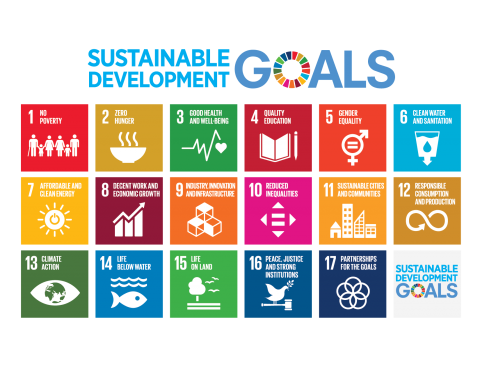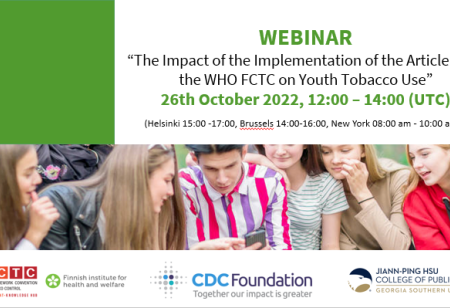
How can national data support monitoring of the SDGs? - 29 April 2019

Written by Dr. Tibor Szilagyi and Ms. Leticia Martinez Lopez (Secretariat of the WHO FCTC)
How can national data support monitoring of the SDGs?
The Secretariat of the WHO Framework Convention on Tobacco Control (WHO FCTC) and the Protocol to Eliminate Illicit Trade in Tobacco Products (the Protocol) is a co-custodian, together with WHO, of target 3.a (“Strengthen the implementation of the World Health Organization Framework Convention on Tobacco Control in all countries, as appropriate”) of the Agenda for Sustainable Development 2030.
In its capacity as co-custodian, the Convention Secretariat is an independent observer member of the Inter-agency and Expert Group on Sustainable Development Goal Indicators (IAEG-SDGs) and as such, the Secretariat was recently invited and attended the ninth meeting of this body. The meeting was held from 25 to 28 March 2019 in Beirut, Lebanon, hosted by the United Nations Economic and Social Commission for Western Asia.
Addressing SDG indicators
The IAEG-SDGs was created in 2015 by the United Nations Statistical Commission and is composed of UN Member States. The Expert Group consists of 27 representatives of national statistical offices (NSOs) and one ex officio member, elected by the regions.
The IAEG-SDGs updated its membership in May 2017, being fully comprised by Parties to the Convention, which are legally bound to implement its provisions. The IAEG-SDGs also works with regional and international agencies, international convention secretariats and other partners, who are invited to its meetings as observers.
The main aim of the group is to develop and implement the global indicator framework of the 2030 Agenda for Sustainable Development. The indicator of target 3.a is “Age-standardized prevalence of current tobacco use among persons aged 15 years and older”, which is measured by WHO with inputs from the Convention Secretariat.
The Conference of the Parties (the governing body of the WHO FCTC), at its seventh session, called upon the Convention Secretariat “to promote WHO FCTC implementation as an essential and high-impact strategy for achieving SDG target 3.4”. Furthermore, the COP also called upon the WHO FCTC Parties “to actively pursue the achievement of SDG target 3.a and strengthen the implementation of the WHO FCTC” and the Convention Secretariat “to take the lead in coordinating support to Parties to this effect in collaboration with WHO and other intergovernmental organizations, and to make all efforts to promote additional related targets including but not limited to gender equality and reduced inequalities”.
In its decisions, COP has made implementation of the Convention an integral part of controlling non-communicable diseases (NCDs) and mandated the Convention Secretariat to engage in the work related to SDG implementation and monitoring.
National data across sectors
There are two points that we wish to make in relation to these developments. First, it is well known that good quality national data is essential for the success of any policy making and is also critical for measuring the implementation of the adopted policies. Article 5 of the Convention calls for the integration of the WHO FCTC into national multisectoral strategies, programmes and plans.
All stakeholders that produce national data, including on the requirements of Article 20 of the Convention, could bring an important contribution to monitoring implementation of the Convention, as well as of target 3.a. The NSOs should be part of any national coordinating mechanism for tobacco control as they have a paramount role in gathering high quality and up-to-date data.
It is also in the interest of Parties that, when fulfilling their obligations under Article 20 of the Convention, they strengthen their national statistical capacity. Promoting such interaction and involvement could be done by the Convention Secretariat at country level, as part of the COP-mandated implementation assistance frameworks, for example through joint needs assessment exercises.
Voluntary national reviews to support monitoring of SDGs
Second, it is important that WHO FCTC Parties include, in their voluntary national reviews (VNRs), reference to target 3.a and their latest progress in the implementation of the WHO FCTC. During the IAEG-SDGs meeting in Beirut, best experiences on monitoring and reporting on SDGs, including VNRs and national data platforms, were presented by countries.
The 2030 Agenda encourages UN Member States to “conduct regular and inclusive reviews of progress at the national and sub-national levels, which are country-led and country-driven”, serving as a basis for the regular reviews by the high-level political forum (HLPF). The VNRs are voluntary, state-led, undertaken by both developed and developing countries, and involve multiple stakeholders.
Countries are expected to report on the actions and measures taken to advance the implementation of the 2030 Agenda, including the SDGs, and where available, to provide information on progress made, taking into account the principle of Leaving No One Behind and on the impact of actions. Countries are strongly encouraged to report on all 17 SDGs or on the ones that are their priorities. To help Parties in their reporting of WHO FCTC implementation as part of their VNRs, the Convention Secretariat will prepare an information note to WHO FCTC focal points and disseminate that among the Parties.
The Convention Secretariat will continue contributing in the work carried out by the IAEG-SDGs, in close collaboration with WHO, on the ground of an excellent cooperation with colleagues from WHO working on the coordination of SDGs work on behalf of the organization. Moving forward, the Secretariat will remain engaged in the process of the 2020 comprehensive review of the indicator framework, including in the area of target 3.a.
About the authors:
Dr. Tibor Szilagyi
Dr Szilagyi is a medical doctor with a postgraduate diploma in internal medicine. He holds an MPhilPH degree from the University of Sydney (Australia) and an MSc in Traditional Chinese Medicine from the University of Pécs (Hungary). He joined the Convention Secretariat in November 2007, where he has worked on a variety of areas, including coordination of reporting by the Parties and managing working and expert groups established by the Conference of the Parties. Since 2010, he has been increasingly involved in country work in providing assistance to governments in their implementation efforts, primarily through leading needs assessment missions and managing the WHO FCTC Knowledge Hubs. The is currently working as team leader of the Reporting and Knowledge Management team of the Convention Secretariat.
Ms. Leticia Martinez Lopez
Ms Martinez is a biochemist with a MSc in Global Health and Public Policy from the University of Edinburgh (Scotland). She serves as technical officer in the Reporting and Knowledge Management team at the Convention Secretariat. In addition to contributing to the analysis of information on implementation of the WHO FCTC by the Parties, she collaborates providing technical assistance to Parties, in areas such as Articles 8, 9 and 10, and 14 of the Convention. She also collaborates with the Knowledge Hubs, and assists the Secretariat on the integration of the WHO FCTC implementation with the global NCDs, tuberculosis and HIV/AIDS agendas, including the 2030 Agenda for Sustainable Development.





